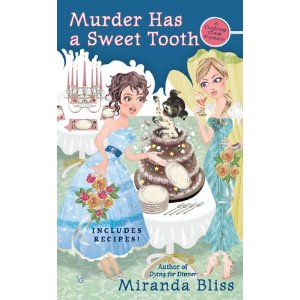Prose from the Pros #2: Miranda Bliss
Are you an aspiring mystery novelist? Well, there’s no better way to improve your mystery writing skills than to learn from a published author. One author I enjoy reading, Miranda Bliss, has written the Cooking Class Mystery series. Today’s discussion of the fifth novel, Murder has a Sweet Tooth (2009), will focus on analyzing its literary elements.
Besides the elements, a basic story structure is important when writing a mystery. A writer employs a specific format to gain the readers trust: a crime occurs, detective investigates the crime and, finally, the mystery is solved. Once you create the skeletal structure of the novel, your style and ingenious plotting build the muscle and present an engaging story.
Character:
Characters are the most important part of the novel. Their personality and lifestyle create the fictional world the crime takes place, provides the motives of the detective and suspects and drives the plot forward. You should intimately know your characters. Keep in mind round characters create engaging writing and give the novel verisimilitude.
Every character needs to work! Avoid overwhelming your reader with unnecessary characters. It causes confusion and slows down the story momentum. Don’t be afraid to fire lazy characters.
The detective or private investigator is the star of the novel. He or she is in charge of solving the crime by examining evidence, collecting clues, asking questions, investigating the suspects and getting into trouble. His or her investment in solving the crime needs to be believable. Annie Capshaw works to exonerate her fiancé’s cousin, Alex, of murder weeks before she gets married in Bliss's novel.
Your novel needs minor characters who show the fullness of the main character's life or the lack there of. They can help solve the crime or provide a romantic element. Eve (Annie’s best friend) and Tyler (Eve’s police officer boyfriend) assist Annie in solving the crime. Jim, her fiancé, provides the romance and support she needs throughout her investigation.
Then, no mystery novel is complete without the suspects. These law-breaking citizens are the reason for the novel. Everyone has a motive, but not everyone did it or did they? If they aren’t the perpetrator, they’re a red herring. You want your reader to solve the crime, but not before the main character does; there’s no incentive to finish reading. So, be sure to make everyone’s motive realistic and believable.
Plot:
Ah, the muscle of the novel. A good mystery should have a main plot and a sub plot. The main plot focuses on solving the mystery. Our heroine, Annie, must go undercover to prove Alex is innocent.
While she is earnest, she can’t possibly spend every minute solving the crime. This is when the sub plot enters the scene. It provides a transition between main scenes, helping the plot continue forward. A novel may contain several sub plots. In her off time, Annie plans her undercover work and wedding.
Plot Element: Suspense
Danger! Danger! Suspense is my second favorite element of a mystery novel, right behind the crime solving. It pulls your reader to the edge of their seat with anticipation. They should be so invested in the story they can’t stop reading. Bliss coaxes her readers to turn the page to the next chapter by:
- Revelation: the main character discovers information, possibly solving the mystery, but leaving more questions to be answered.
- Imminent Peril: Main character finds trouble at end of chapter, the reader must continue to read to find out what happens.
- Delayed Gratification: the main character keeps the reader on the hook by waiting to reveal new information pertinent to solving the mystery.
So, what are you waiting for? Write down that mystery novel hiding in your imagination. Whether it’s in the planning or revision stages, be sure your story follows these guidelines to ensure a quality mystery guaranteed to your entertain readers.
What mystery writers do you admire? What apsects of their writing do like?




Comments